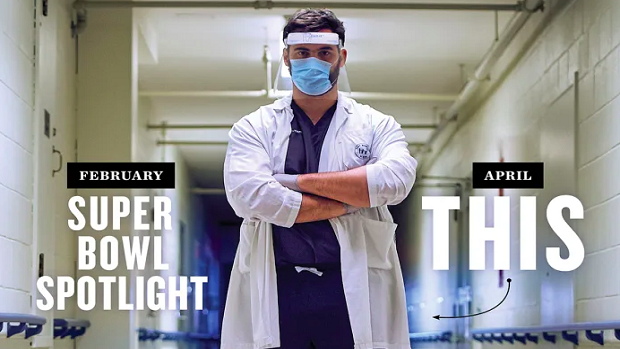A lot has changed over the past couple of months and if there’s one person who’s seen it all first hand it’s Laurent Duvernay-Tardif.
At the beginning of February, the Canadian right guard was protecting Patrick Mahomes in the Super Bowl. By the end of April, he was working the front lines for the COVID-19 pandemic.
The 29-year-old Mont-Saint-Hilaire, Quebec native plays for the Kansas City Chiefs, but the McGill graduate also happens to be a doctor, and is the first medical school graduate to ever play in the NFL. Now, he’s doing his part by helping out at a Quebec long-term care facility.
The following is courtesy of Sports Illustrated.
"My first day back in the hospital was April 24. I felt nervous the night before, but a good nervous, like before a game, and I packed everything neatly: scrubs, white coat, extra pens, even a second pair of shoes that I could leave in my locker, knowing they were clean. I wasn’t aware the Chiefs had drafted a running back that night in the first round, even though I will block for my future teammate, Clyde Edwards-Helaire, from LSU.
"I was assigned to a long-term care facility near my hometown on the South Shore, which is about an hour from Montreal. On my drive in, I thought about my own draft experience, back in 2014, when I missed a second-day draft party at my house because I was working at the hospital, in an intensive care unit, helping with an emergency C-section. The Chiefs took me the next day, in the sixth round."
Duvernay-Tardif mentioned that he spoke to the Chiefs about helping out and if it was against anything in his contract, but said the team was fully supportive of his decision to give back. After thinking it over and taking some crash courses, the Chiefs’ offensive lineman was out on duty doing his thing.
"My shift started at 7:30 a.m. I found out that I would be working for now in more of a nursing role, helping relieve the workers who have already been in place. There’s so much that needs to happen just to visit with every patient—masks donned and hands washed and equipment like gloves and visors tugged on and off and thrown away. I handled a medication cart, making sure to administer the right dosage and in the proper way. Honestly, I was drained after—and looking forward to going back," recalled the Chiefs' lineman.
"It’s wild to think that just 10 weeks earlier I played in the biggest game in sports. I was reminded of that even at the facility, when one of the people training me turned and said, “You’re the football player, right?” When I answered yes, he said, “Bro, you just won the Super Bowl.” Indeed, I told him, and now I just want to help.”
Not all heroes wear capes.
You can read the entire article here.
(H/T Sports Illustrated)










